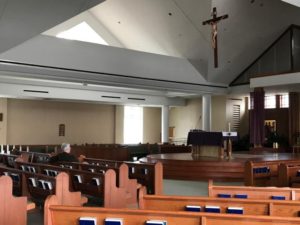The key identifying marks of any religious body (and for that matter, any church) is their core beliefs and practices. As there are different churches in the world, having and teaching different, divergent and sometimes opposing doctrines, each one can be identified by certain marks.
The major identifying mark of the Church of Christ is their zeal and insistence on doing Bible things the Bible way. They are resolute to speak where the Bible speaks, and be silent where the Bible is silent, and thus, “speak as the oracles of God” (1 Peter 4:11). Hence, the Bible is their ONLY source of learning and knowing God’s will for man today.
They do not believe in (and reject) any new revelation, either by a spirit or through someone’s personal feeling/experience, if that feeling/experience and/or revelation is contrary to what they see in God’s holy word (the Bible). Hence, in the light of prayer and tongues-speaking, the Bible is their only source of knowledge, reference and practice.
There is a lot of confusion in the religious world today with regards to prayer and tongues-speaking. A host of religious leaders and groups have claimed tongue speaking as a religious experience that indicates spiritual growth and closeness to God, and that Christians should seek after this gift, receive it, and speak it just as the apostles did in Acts 2.
In clarifying this gift, I wish to affirm that, true biblical tongue-speaking does not exist today. One of the identifying marks of the Church of Christ in this disposition is their not speaking in tongues in their worship assemblies, and I wish to point out the Biblical facts why it is so.
GLOSSOLALIA VRS ECSTATIC SPEECH
The word glossolalia, an anglicized word that is made of two Greek words,is a common term that is used to refer to speaking in tongues: glossa (tongue) and lalia (speech). Together the two words mean “tongue-speech” or “speaking in tongues”.
Speaking in tongues is a spiritual phenomenon and has a variety of meanings in the religious world today. Three things need to be considered carefully:
1. Biblical speaking in tongues (i.e., as seen in the Bible) refers to the Holy Spirit miraculously enabling a person to speak (things pertaining to God) fluently in a foreign language or languages that he/she has never, ever heard or studied.
This is a New Testament phenomenon which was practiced only during the first century.
2. Non-biblical ecstatic utterances: This is what actually occurs today. It is a psychological phenomenon, a real happening which excites the individual’s experience while in a hyper-emotional state.
Thus, modern-day ecstatic speech is the phenomenon of uncontrollable utterances of gibberish. Gibberish, here, refers to rapid chatter; uncomprehensive meaningless talk. This is in contrast to what the Bible teaches.
Ecstatic tongue speaking is not related exclusively to Christianity – It is to be found in all different cultural strata from non-Christian priests to medicine men.
In fact, its origins are discovered in non-Christian religions. We must affirm that modern-day glossolalia or ecstatic speech is a pagan practice and a deception of Satan which has been brought in under the umbrella of Christianity. It is a non-Christian experience.
Burdick rightly concluded, “Present-day glossolalia is deceptive. It often is a psychological attempt to recreate the supernatural gift of the first century. Because of the complexity of human nature, when the proper conditions are present man is able to work himself into an experience which he thinks to be the same as New Testament glossolalia. Careful examination, however, has shown us how different such experiences seem to be from the phenomenon clearly described in Acts 2” (31:83).
THE PURPOSE OF TONGUES
There were three purposes of tongues speaking in the early church (in the first century). It is for Signaling, edifying and evangelism.
1. SPEAKING IN TONGUES WAS A SIGN TO UNBELIEVERS
In Mark 16:17, Jesus had promised that signs would go with those who believe.
All the nine miraculous or spiritual gifts mentioned in 1 Corinthians 12:8–10 (wisdom, knowledge, faith, healing, working of miracles, prophecy, discerning of spirits, divers kinds of tongues, and interpretation of tongues) were ‘signs’ designed to convince unbelievers of the heavenly origin of Christianity. They were an open manifestation that God was working miraculously in the church.
Mark 16:20 – “And they went forth and preached everywhere, the Lord working with them and confirming the word by the signs that followed.”
Hebrews 2:3–4 – “How will we escape if we neglect a great salvation, which at first began to be spoken by the Lord, and was confirmed to us by those who heard Him, God also bearing witness with them, both with signs and wonders and with various powers and gifts of the Holy Spirit, according to His own will?”
1 Corinthians 14:22 – “Therefore, tongues are for a sign, not to those who believe, but for unbelievers…”
See also Ephesians 4:11–16.
2. TONGUES WERE FOR EDIFICATION OF CHRISTIANS
1 Corinthians 14:4 – “He who speaks in a tongue edifies himself, but he who prophesies edifies the church.”
The Holy Spirit gave some individuals in the early church the ability to speak languages miraculously not only for a sign to unbelievers that Deity was with the believers, but also to edify both the speaker and his co-worshippers.
In the absence of an interpreter, only the one who spoke in tongues was edified. However, if an interpreter was present, then the speaking in tongues (languages) could edify the whole congregation. Notice that God never gave anyone the miraculous gifts for the person’s selfish benefits, but rather for the benefit of all (see 1corinthians 12:7).
Therefore, anyone who spoke in tongues in church to the hearing of others who do not understand the language spoken was actually embarking on a useless venture. So, the Holy Spirit ministered to the infant churches in the first century through the individuals in the congregations who had received the laying on of the apostles’ hands. All was done for the building up of the body of Christ.
3. TONGUES WAS FOR EVANGELISM
The early evangelists were commissioned to go to every ethnic group of the world to preach the gospel (Matthew 28:19–20). Can you imagine how much time it could take Paul, for example, to learn to be able to speak each and every language of the ethnic groups he preached to, establishing churches in all of them? He was gifted by the Holy Spirit to speak in many languages which he never learnt before.
He said in 1 Corinthians 14:18, “I thank my God I speak with tongues more than you all”.
SPEAKING IN TONGUES HAS CEASED!
The New Testament teaches that the open manifestation of miracles to confirm the (already spoken) word of God has passed away. This includes speaking in tongues.
1 Corinthians 13:8–10, 13
“Love never fails. But where there are prophecies they shall fail; where there are tongues, they shall cease; where there is knowledge, it shall vanish away. 9 For we know in part, and we prophesy in part. 10 But when that which is perfect is come, then that which is in part shall be done away. And now abide faith, hope, and love, these three. But the greatest of these is love.”
‘When that which is perfect is come, then that which is in part shall be done away’ should be understood as ‘when that which is complete has come, then that which is in part will be done away.’ Here, Paul affirms that when the perfect (that which is complete or whole) has come, that which is in part (the miraculous gifts) will be done away.
In this context, the perfect has reference to the Spirit’s revelation in James 1:25 – “But he who looks into the perfect law of liberty and continues to abide in it, not being a forgetful hearer, but a doer of the work, this man will be blessed in his work” – the law of Christ in its fully revealed form.
Notice the following in context:
- The perfect is contemporary with faith, hope and love (vs 13). The perfect (whole) is NOT pointing to Jesus Christ or His second coming. We need faith and hope NOW, in our life time, in waiting for His coming. After Jesus comes, faith and hope will no longer exist (See Romans 8:24, 25; Hebrews 11:1). Paul is saying that faith and hope co-exist with that which is perfect. Therefore, the perfect must exist during this dispensation before the coming of Christ.
- The perfect is in contrast to the part. That which is perfect in verse 10 is in contrast with that which is in part in verse 9. It would be in contrast specifically with the gifts of knowledge and prophecy. Generally, Paul used these two gifts to stand for all the gifts.
- The perfect is the complete revealed will of God (the New Testament). The completion of the revelation of God made unnecessary the gifts of prophesy and knowledge (and all the miraculous gifts). The completion of the perfect law of liberty made the miraculous gifts redundant. They were not necessary after the faith “was once for all delivered to the saints” (Jude 3). Through the inspired scriptures, the Christian is made “…complete, thoroughly equipped for every good work” (See 2 Timothy 3:16, 17).
The power of God “has given to us all things that pertain to life and godliness, through the knowledge of Him who called us by glory and virtue” (2 Peter 1:3).
SUMMARY
1 Corinthians 13:8–10, 13 teaches that miraculous gifts (prophecy, knowledge, etc.) were to be done away (vs 8). Paul teaches that these gifts were only a part of the whole which was to come (vs 9). When the perfect (whole/complete) came, then the partial would be done away (vs 10).
The complete revelation of God, therefore, was to replace the partial revelation which was at the time Paul was writing the letter, coming to the Corinthians through the gifts of prophecy and knowledge. That which is “perfect”, “complete” or “whole” is the complete revelation of God’s word – the NEW TESTAMENT.
Therefore, when the word was confirmed by the miracles and the NEW TESTAMENT was completed in written form, the miraculous gifts ceased. Scriptural glossolalia, consequently, has ceased.
Written By: Mawuko Mensah Ntatefe (Minister, Kotobabi No2. Church of Christ, Accra- +233244697998)




